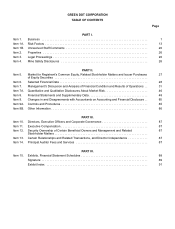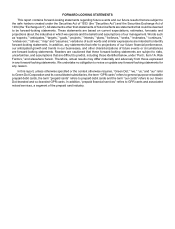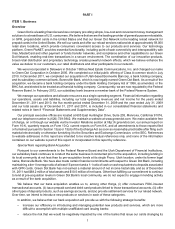Green Dot 2011 Annual Report Download - page 18
Download and view the complete annual report
Please find page 18 of the 2011 Green Dot annual report below. You can navigate through the pages in the report by either clicking on the pages listed below, or by using the keyword search tool below to find specific information within the annual report.8
• the ability to reload funds;
• ability to develop and maintain strong relationship with retail distributors;
• compliance and regulatory capabilities;
• pricing; and
• large customer base.
We believe our products compete favorably on each of these factors.
Intellectual Property
We rely on a combination of trademark and copyright laws and trade secret protection in the United States, as
well as confidentiality procedures and contractual provisions, to protect the intellectual property rights related to our
products and services.
We own several trademarks, including Green Dot, MoneyPak and the Green Dot logo. These assets are essential
to our business. Through agreements with our network acceptance members, retail distributors and customers, we
authorize and monitor the use of our trademarks in connection with their activities with us.
We have one patent application under consideration in the United States related to the retail packaging of our
cards.
Regulation
Compliance with legal and regulatory requirements is a highly complex and integral part of our day-to-day
operations. Our products and services are generally subject to federal, state and local laws and regulations, including:
• anti-money laundering laws;
• money transfer and payment instrument licensing regulations;
• escheatment laws;
• privacy and information safeguard laws;
• banking regulations; and
• consumer protection laws.
These laws are often evolving and sometimes ambiguous or inconsistent, and the extent to which they apply to
us, our subsidiary bank or the banks that issue our cards, our retail distributors, our network acceptance members or
our third-party processors is at times unclear. Any failure to comply with applicable law — either by us or by the card
issuing banks, retail distributors, network acceptance members or third-party processors, over which we have limited
legal and practical control — could result in restrictions on our ability to provide our products and services, as well as
the imposition of civil fines and criminal penalties and the suspension or revocation of a license or registration required
to sell our products and services.
We continually monitor and enhance our compliance program to stay current with the most recent legal and
regulatory changes. We also continue to implement policies and programs and to adapt our business practices and
strategies to help us comply with current legal standards, as well as with new and changing legal requirements affecting
particular services or the conduct of our business generally. These programs include dedicated compliance personnel
and training and monitoring programs, as well as support and guidance to our retail distributors and network acceptance
members on compliance programs.
Anti-Money Laundering Laws
Our products and services are generally subject to federal anti-money laundering laws, including the Bank Secrecy
Act, as amended by the USA PATRIOT Act, and similar state laws. On an ongoing basis, these laws require us, among
other things, to:
• report large cash transactions and suspicious activity;
• screen transactions against the U.S. government’s watch-lists, such as the Specially Designated Nationals
and Blocked Persons List maintained by the Office of Foreign Assets Control;
• prevent the processing of transactions to or from certain countries, individuals, nationals and entities;
• identify the dollar amounts loaded or transferred at any one time or over specified periods of time, which
























